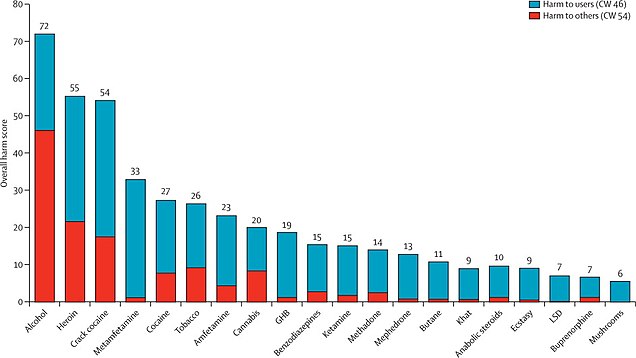Allow me to reintroduce the Multi Criterion Decision Analysis (MCDA) tool championed by Professor David Nutt back in 2011. Before I do though, did you know he released a new book this year?
Drink? The New Science of Alcohol and Your Health can be purchased here and, unsurprisingly, is a scientific look at the relative harms surrounding alcohol consumption.
Alcohol – a simple molecule that can induce so much pleasure and pain at the same time… As the most harmful drug in the UK, it has a profound and wide-reaching impact on our health and on society at large. Drink? is the first book of its kind, written by a scientist and rooted in 40 years of medical research and hands-on experience treating patients. Professor David Nutt cuts through the noise to explain the long- and short-term effects of alcohol, makes complex science digestible and takes readers through its journey inside the body and brain from the very first sip.
That aside, I thought it might be time for a refresher on the Professor’s earlier work; in particular the other end of the spectrum. The MCDA tool elaborates a spectrum, from most harmful drug to the user and those around them to the least harmful (when both discrete scores out of 50 are combined to achieve a score out of 100) and whilst much has been made by commentators such as myself on the ‘most harmful’ end occupied by alcohol, not a whole lot of attention has been laid upon the opposite, namely the ‘least harmful’ end.

I guess that has been largely because the other end is relatively ‘quiet’. In a classroom of the most commonly-used drugs in society Alcohol is the child with ADHD, Tourette’s, Oppositional Defiance, Fetal Alcohol Syndrome, as well as various visual and auditory processing issues, amongst other significant learning and behavioural difficulties. Alcohol’s report would read something like this:
Alcohol has tried very hard this year to put in his (definitely male pronoun here) best, and loudest work, but this has been largely tarnished by significant outbursts of both physical and verbal assaults on his peers, as well as his teachers. Alcohol can appear at times to be very arrogant and happy amongst his peers, but moments later he can be found to be assaulting some of his closest friends, with little to no provocation on their part.
His largely remorseless actions are often balanced by a deep despairing regret that comes when the realisation of his inappropriate and negative behaviour final becomes apparent to him, but such instances can be few and far between. Obviously, his behaviour rules out any significant learning on his behalf as he is either too distracted to participate or he has to be forcibly removed from the environment for violent behaviour. It is also a major source of discomfort and trauma in the class. I would go so far as to suggest that Alcohol would be best served by having his actions and education being restricted to a particular area where his behaviour can be monitored closely by trained professionals in special needs education. Unfortunately we are no longer able to cater to his very significant and pressing needs within our school.

That’s a grim report right there. No Macca’s or movies after that one, and rightly so you may say, but that is just Alcohol being Alcohol. You can’t blame the sun for shining you know?
The other end of the spectrum offers up a vastly different picture; Psilocybin’s report would look very different indeed:
Psilocybin has been a real quiet achiever for the last few years, working away industriously in the background and achieving incredible results despite significant distractions and dramas in her (female pronoun seems to be more appropriate, no?) immediate classroom surroundings. Despite numerous false accusations leveled against her, largely by Alcohol and Tobacco, both known for their poor behaviour and disregard for fellow student welfare, she has managed to be an example to her peers, not only in terms of the work she has accomplished, but also in the degree to which she has been successful in it, and how little she has let her success impact on the learning of her classmates

Psilocybin has shown a remarkable capacity for empathy and understanding of her peers, particularly if they have had recent trauma or depression, but she also bears no grudge against those who have wronged her, to the point where she has actively been helping both Alcohol and Tobacco to be less dependent on other student’s attention. Every one of her peers who interacts with her comes away with an experience they will remember for the rest of their life, which is truly remarkable. In terms of academics, she seems to the repository of much ancient and somewhat arcane wisdom, which she often shares cryptically, with much colour and visual spectacle. Her artistic capacities are very highly developed, and her poetic, visual art, sculptural and musical talents are truly exceptional.
She provides much inspiration to her classmates in these areas, and I believe she has latent abilities the likes of which I have never seen, waiting to be uncovered and expressed. She is an absolute joy to have in the classroom, and her enigmatic and sage-like nature have ensured she is a much respected and revered member of the class, and although she can often cause the class to dissolve in to fits of hysterical giggling, it is a cathartic and welcome release for everyone.
Yes, the mushroom has much to offer students indeed. To the point where one may well perceive the need for a harm reduction resource aimed at eliminating the relatively manageable harms associated with mushroom use altogether. Hmmm, a book on mushrooms, aimed at providing information about the historical and modern day use of psilocybin mushrooms, and identification and environmental information to ensure no poisonous counterfeits are eaten by mistake? Specific to say, South East Queensland, Australia?
I reckon I know someone who could write that…
What do you think?


Sexist much?